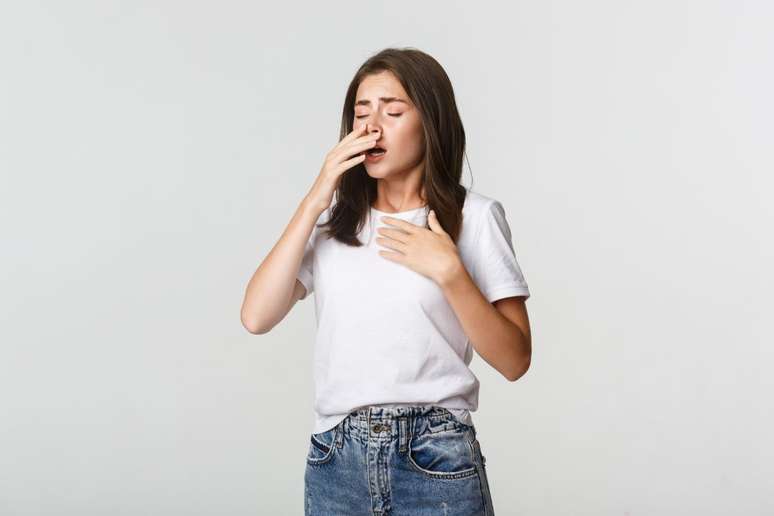Find out how to protect yourself from two respiratory allergies during the coldest months of the year
In addition to colds and flu, rhinitis and sinusitis are other respiratory problems that become even more frequent during the winter. This is mainly due to the decrease in air humidity, the increase in the concentration of pollutants, low temperatures and the fact that we spend more time indoors.
html[data-range=”xlarge”] figure image img.img-f1e66e57d137abcc60ad060a3cc08d519gcj10p1 { width: 774px; height: 516px; }HTML[data-range=”large”] figure image img.img-f1e66e57d137abcc60ad060a3cc08d519gcj10p1 { width: 548px; height: 365px; }HTML[data-range=”small”] figure figure img.img-f1e66e57d137abcc60ad060a3cc08d519gcj10p1, html[data-range=”medium”] figure image img.img-f1e66e57d137abcc60ad060a3cc08d519gcj10p1 { width: 564px; height: 376px; }
According to data from the Brazilian Association of Allergy and Immunology (ASBAI), about 60 million Brazilians live with some type of respiratory allergy. The number represents 30% of the country’s population. In view of this, it is essential to talk about ways to prevent these conditions, especially this season.
Oh, and a word of warning: If you have persistent or severe symptoms, be sure to see a doctor for proper evaluation and treatment.
Rhinitis X SINUSITIS
A Dr. Cristiane Passos Dias Levy, otorhinolaryngologist at the Paulista Hospital and allergy specialist, clarifies the differences between rhinitis and sinusitis. According to her, the first consists of a more recurring condition among us and can appear at any time of the year, although it manifests itself more intensely in winter. Its main symptoms are: runny nose, sneezing, cough, itchy throat and red watery eyes.
“In winter, the incidence of rhinitis can be influenced by various factors, such as the decrease in air humidity, the increase in the concentration of pollutants and greater exposure to allergens, such as dust mites and fungi, which can proliferate in enclosed and poorly ventilated environments.” he says.
Acute sinusitis is usually associated with respiratory infections, such as flu and colds, which can lead to inflammation of the sinuses, causing pain in regions of the face. Fever, body aches, tiredness, cough, loss of appetite and nasal congestion are other ailments commonly presented by patients suffering from this condition.
“This predisposition is accentuated by cold, dry air in winter, which dries out the respiratory tracts, making them more susceptible to infections. In addition, the higher concentration of pollutants in the air in some urban areas can also contribute to the development of sinusitis.” emphasizes the doctor.
As told by Dr. Christians, people with deviated septum, nasal polyps, smokers and people who abuse nasal decongestants are more sensitive this time of year.
PREVENTION
Next, the specialist lists some of the practical measures that can be taken to avoid both rhinitis and sinusitis. Watch:
housecleaning
For the doctor, surely one of the most important precautions is to always keep the house clean, ventilated and free from dust. So, clean the rooms regularly with a damp cloth and also with a vacuum cleaner. Also, he reminds you not to hoard items that can harbor dust, such as carpets, stuffed animals, and curtains.
humidity control
Considering that rhinitis and sinusitis are respiratory allergies, it is essential to ventilate the house daily. This helps to avoid excessive humidity in the environment, a factor that contributes to the proliferation of moulds, mites and fungi, agents that can trigger problems.
avoid smoking
Smoking is a habit that irritates the respiratory tract, favoring the development of allergies. Therefore, the best way to prevent rhinitis and sinusitis is to avoid smoking or exposure to cigarette smoke.
Beware of allergens
It is vital to identify and avoid exposure to allergens as much as possible, including pollen, dust mites, pet dander and mold.
Maintain a balanced diet
A balanced and nutritious diet is essential for strengthening the immune system and reducing the susceptibility to allergies. Some foods that play a significant role in boosting immunity are: citrus fruits, green vegetables, and nuts.
sanitize your hands
When it comes to preventing the spread of germs and bacteria that can cause allergies, hand hygiene with soap and water or alcohol gel is one of the most necessary strategies. After all, everything we touch can be full of microorganisms that are harmful to our health.
Source: Terra
Ben Stock is a lifestyle journalist and author at Gossipify. He writes about topics such as health, wellness, travel, food and home decor. He provides practical advice and inspiration to improve well-being, keeps readers up to date with latest lifestyle news and trends, known for his engaging writing style, in-depth analysis and unique perspectives.









